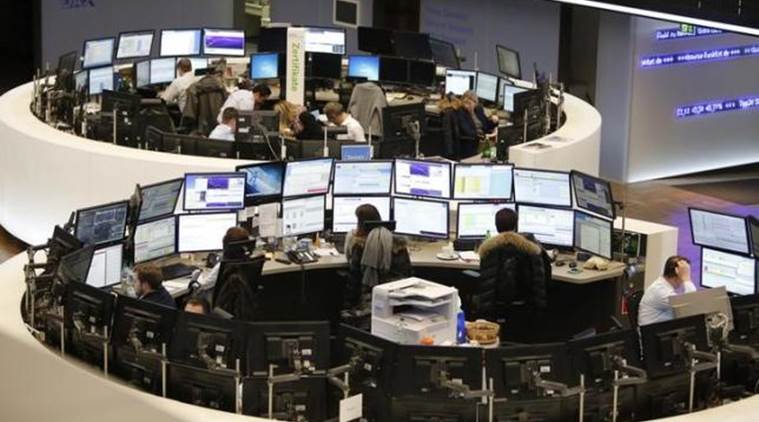European stocks rebounded as oil trimmed losses after the the International Energy Agency said pent-up demand would absorb record crude output.
The Stoxx Europe 600 Index rose 0.4 percent, with miners and energy producers trimming losses, as crude pared a drop of as much as 1.5 percent after the IEA forecast. Asian equities fell. New Zealand’s dollar surged to a one-year high after the country’s central bank cut interest rates and signaled a more gradual easing path than some investors had anticipated. Nickel snapped a four-day advance. Ukraine’s 2019 Eurobond fell the most since June amid signs tension is increasing with Russia.
Crude entered a bear market last week and the outlook remains clouded as Saudi Arabia and Iran refuse to give ground in their war for market share, with both boosting output just days after OPEC announced an informal meeting to discuss ways to stabilize falling prices. Exacerbating the problem is global demand, which remains weak even as policy makers from Frankfurt to Tokyo engage in unprecedented stimulus to boost their economies. A strengthening jobs market in the U.S. has yet to convince traders that the world’s biggest economy is strong enough for the Federal Reserve to raise interest rates this year.
A gauge of U.K. home sales pointed to the fastest decline in transactions since the global financial crisis in 2008, Royal Institution of Chartered Surveyors data showed on Thursday. Singapore cut the top end of its 2016 growth forecast after the economy expanded less than previously estimated in the second quarter. Financial markets in Japan were shut for a holiday.
Commodities
West Texas Intermediate crude fell 0.2 percent to $41.63 a barrel at 11:15 a.m. in London, after sinking 2.5 percent on Wednesday when official data showed U.S. supplies increased by 1.06 million barrels last week.
The IEA said in its monthly report that an increase in the volume of crude processed this quarter will shrink brimming stockpiles even as Saudi Arabia, Kuwait and the United Arab Emirates pump at all-time highs. The updated outlook comes a day after the Organization of Petroleum Exporting Countries said weakness in global crude markets may persist as demand slows seasonally and fuel inventories remain abundant.
Saudi Arabia, the world’s largest crude exporter, boosted oil output to a record 10.67 million barrels a day in July, according to OPEC data published Wednesday. In Iran, production has risen to 3.85 million barrels a day — the highest since 2008 — according to comments from Oil Minister Bijan Namdar Zanganeh reported by the Fars news agency.
Weak oil hurt sentiment on demand for commodities, ending a four-day rally in nickel. The metal dropped 0.9 percent to $10,765 a metric ton after Monday touching a one-year high. Zinc fell 0.2 percent and tin lost 0.8 percent.
“Crude oil’s damping market sentiment for metals,” Zhao Qiannan, an analyst with Beijing Newnie E-commerce Co., said by phone from Shanghai.
Stocks
TThe Stoxx 600 rebounded from a decline of as much as 0.2 percent, as gauges of miners and oil companies came off session lows. The number of shares changing hands was about a third less than the 30-day average.
Zurich Insurance Group AG added 4.2 percent after saying earnings fell less than projected. KBC Group NV advanced 5.5 percent after posting better-than-expected profit and revenue and cutting its forecast for 2016 loan-loss provisions in Ireland.
K+S AG, Europe’s biggest potash producer, slipped 9.2 percent after saying it expects lower earnings in 2016. Thyssenkrupp AG lost 0.7 percent after Germany’s biggest steelmaker reported a decline in quarterly profit.
S&P 500 futures rose 0.2 percent after the underlying equity benchmark declined 0.3 percent on Wednesday, retreating from a near-record high. Investors will look Thursday to earnings from retailers including Macy’s Inc. for indications of the health of the American consumer.
Stocks have benefited from better-than-forecast earnings this season, particularly among technology companies. With about 90 percent of S&P 500 members having posted results, 78 percent have beaten profit predictions and 56 percent have topped sales projections.
The MSCI Asia Pacific excluding Japan Index fell 0.2 percent, slipping from a one-year high. Australia’s S&P/ASX 200 Index dropped 0.6 percent as benchmarks lost ground in Shanghai and Taiwan.
Hong Kong’s Hang Seng Index climbed 0.4 percent, led by financial companies, after the head of the city’s bourse operator told CNBC an exchange trading link with the Chinese city of Shenzhen will soon be announced. Hong Kong Exchanges & Clearing Ltd. jumped 2.9 percent, its biggest increase since May.
The MSCI Emerging Markets Index slipped 0.1 percent after advancing five days to the highest close since July 2015. Gulf stocks declined on Thursday, with the Bloomberg GCC 200 Index losing 0.4 percent, trimming this week’s gain to 1.3 percent.
Currencies
The kiwi rose as high as 73.41 U.S. cents, its strongest level since May 2015, before trading 0.5 percent stronger on the day at 72.40. The Reserve Bank of New Zealand reduced its key rate by 25 basis points to 2 percent. While the cut was expected by all 16 economists surveyed by Bloomberg, the swaps market had priced in a 20 percent chance of a half-point reduction.
“Even though the 25 basis-point rate cut was fully priced in, there was uncertainty that the RBNZ could even have opted for a 50 basis-point rate cut,” said Angus Nicholson, a market analyst in Melbourne at IG Ltd. “Once the 50 basis-point fears turned out to be unfounded the kiwi dollar promptly rallied.”
Bloomberg’s dollar index, a gauge of the greenback versus 10 major peers, rose 0.1 percent. It ended the last session at a seven-week low as the probability of a U.S. interest-rate increase this year slipped by four percentage points to 41 percent in the futures market.
The Swedish krona was little changed, erasing gains after touching the strongest level against the dollar in more than a month, following better-than-expected July inflation data Thursday.
The MSCI Emerging Markets Currency Index dropped 0.1 percent. South Korea’s won snapped a five-day advance, weakening 0.5 percent after reaching its strongest level in more than a year on Wednesday. Bank of Korea Governor Lee Ju Yeol kept the benchmark interest rate at 1.25 percent and said the authority has scope for more policy adjustments. The ringgit slid 0.4 percent as lower crude prices dimmed prospects for Malaysia, the region’s only major net oil exporter.
The MSCI currency gauge has climbed 3.6 percent since China’s surprise yuan devaluation a year ago roiled global markets. Brazil’s real led gains in the past 12 months, up 11 percent, followed by South Korea’s won with a 7.2 percent jump. The biggest loser was Argentina’s peso, declining 37 percent after the country scrapped currency controls. The yuan has dropped 4.8 percent in the period.
Bonds
The yield on U.S. Treasuries due in a decade rose two basis points to 1.51 percent. It fell on Wednesday as 10-year notes were auctioned at the lowest yield in four years amid near-record demand from a group of buyers that includes foreign central banks and mutual funds. The U.S. is scheduled to sell $15 billion of 30-year bonds Thursday.
U.K. 10-year bonds were little changed, after a three-day rally in the securities pushed yields to a record low on Wednesday. Gilts have been boosted this week on signs the Bank of England may need to pay higher prices to purchase enough to meet the target for its expanded quantitative-easing program.
Ukraine’s 2019 Eurobond fell the most since June 27, sending the yield up 39 basis points to 7.85 percent. Officials in Kiev warned that Russia’s accusation that its agents engaged in “terror” tactics in Crimea may be a ploy to justify the Kremlin escalating the military conflict as fighting between Ukrainian forces and Russian-backed separatists intensified in the country’s east. Russia’s ruble slipped 0.2 percent.
Yields on Australian bonds due in a decade fell for a third day, declining by two basis points to 1.86 percent. New Zealand’s two-year bonds fell and its 10-year notes advanced, flattening the so-called yield curve, following the central bank’s policy meeting.


 Forex2 weeks ago
Forex2 weeks ago


 Naira2 weeks ago
Naira2 weeks ago
 Naira4 weeks ago
Naira4 weeks ago
 Company News4 weeks ago
Company News4 weeks ago
 Billionaire Watch1 week ago
Billionaire Watch1 week ago




 Naira2 weeks ago
Naira2 weeks ago




 Naira4 weeks ago
Naira4 weeks ago




 Naira1 week ago
Naira1 week ago

















